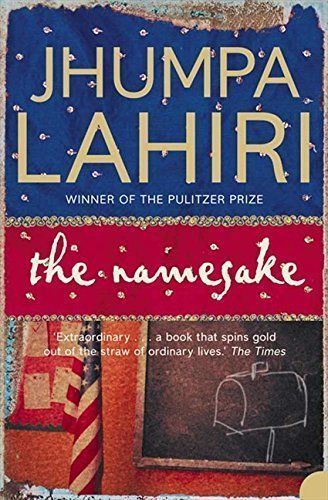
The Namesake
'The Namesake' is the story of a boy brought up Indian in America. 'When her grandmother learned of Ashima's pregnancy, she was particularly thrilled at the prospect of naming the family's first sahib. And so Ashima and Ashoke have agreed to put off the decision of what to name the baby until a letter comes...' For now, the label on his hospital cot reads simply BABY BOY GANGULI. But as time passes and still no letter arrives from India, American bureaucracy takes over and demands that 'baby boy Ganguli' be given a name. In a panic, his father decides to nickname him 'Gogol' - after his favourite writer. Brought up as an Indian in suburban America, Gogol Ganguli soon finds himself itching to cast off his awkward name, just as he longs to leave behind the inherited values of his Bengali parents. And so he sets off on his own path through life, a path strewn with conflicting loyalties, love and loss... Spanning three decades and crossing continents, Jhumpa Lahiri's much-anticipated first novel is a triumph of humane story-telling. Elegant, subtle and moving, 'The Namesake' is for everyone who loved the clarity, sympathy and grace of Lahiri's Pulitzer Prize-winning debut story collection, 'Interpreter of Maladies'. ng continents, Jhumpa Lahiri's much-anticipated first novel is a triumph of humane story-telling. Elegant, subtle and moving, 'The Namesake' is for everyone who loved the clarity, sympathy and grace of Lahiri's Pulitzer Prize-winning debut story collection, 'Interpreter of Maladies'.
Reviews
ali@aliicr96
Amelia C @coffeewithamelia
Sarah Sammis@pussreboots
PSD@steeled
Filip Stan@filipthegod
samiha@incel_nation
Faith Ho @faithho
Midori Kobayashi@snortingpages
Jeannette Ordas@kickpleat
Sara@sarawiser
ella mayo@ellamayo
cece@ccjrrds
Vivian@vivian_munich
Lana@lanareads5
Vivian@vivian_munich
Claudia@clauds
Lis@seagull
chloe mcpherson@randombookhoarder
Daryl Houston@dllh
Jessica Smith@jayeless
Sam@samyakr
Carolina Lopes@carolina
Bruna Acioly Leão@bruna
Janet Doré@vistacanas
Highlights
Bhavya Sharma@bhavya
Page 289
Bhavya Sharma@bhavya
Page 247
Bhavya Sharma@bhavya
Page 83
Bhavya Sharma@bhavya
Page 16